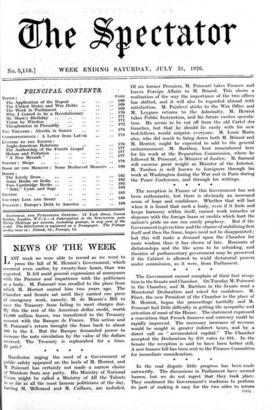Manifestos urging the need of a Government of public safety
appeared on the heels of M. Herriot, and • Poineare, has certainly not made a narrow choice of Ministers from any party. His Ministry of National rnion might be called a Ministry of All the Talents in so far as all the most famous politicians of the day, barring M. Millerand and M. Caillaux, are included. Of six former Premiers, M. Poincare takes Finance and leaves Foreign Affairs to M. Briand. This shows a realization of the way the importance of the two offices has shifted, and it will also be regarded abroad with satisfaction. M. Painleve sticks to the War Office and M. Leygues returns to the Admiralty. M. Herriot takes Public Instruction, and his future excites specula- tion. He seems to be cut off from the old Cartel des Gauches, but that he should' lie easily with his new bed-fellows would surprile everyone. M. Louis Marin also, who did much to bring doivn both M. Briand and M. Herriot, might be expected to add to the general embarrassment. M. Barthou, best remembered here for his work at. the Reparation Commission, where he followed M. Poincare, is Minister of Justice. M. Sarraut will exercise great weight as Minister of the Interior. M. Tardieu is well known to foreigners through his work at Washington during the War and in Paris during the Peace Conference, and thrOugh his writings.
* *


































